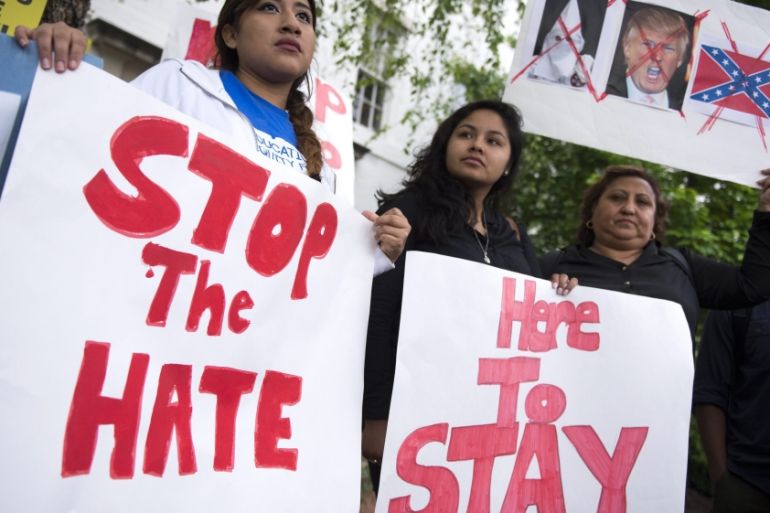Immigrants and Donald Trump: It’s a complicated story
The country that they knew growing up seems to be changing for the worse in their eyes.

Before his attack on the Khans – immigrant parents of a United States soldier who was killed in Iraq in 2004 – many immigrants in the United States and their children had voiced support for the Republican candidate Donald Trump.
This may seem odd given that Trump has spoken about building a wall along the Mexican border, barring Muslims from entering the US, and making disparaging comments against various ethnic and religious groups.
Keep reading
list of 4 itemsSouth Africa’s Ramaphosa signs health bill weeks before election
As South Africa votes, Zimbabwean migrants, smugglers anxious about future
‘As someone with Palestinian heritage, I couldn’t stay in the Labour Party’
One would think that such comments would have made Trump radioactive among immigrants and their descendants, but that was not the case.
|
|
Immigrants for Trump
A considerable number of legal immigrants in the US say they played by the rules and waited many years before they were allowed to immigrate.
They believe illegal immigrants took advantage of the porous US-Mexican border or overstayed in the country with their visitor visas illegally. The main argument is that this is fundamentally a question of fairness.
One Indian-American legal immigrant told The New York Times earlier this year that “You should not reward people who have broken the law … That’s why I like Donald Trump when he says, ‘Let’s build a wall.'” He added, “I believe anybody who came to this country illegally should be deported.”
Another reason many legal immigrants have voiced support for Trump is because he is the quintessential entrepreneur in their estimation.
READ MORE: What did Muslims at the RNC think of Donald Trump?
It is fair to say that most immigrants who come to the US want to achieve the American dream that, in their eyes, means starting a business, prospering and giving their children a better life than they had back in their old country.
What about the children and the future generations of legal immigrants? Many of them saw how hard it was for their parents to earn a living in the US – in reality the American dream was a real struggle – as they faced language barriers and, at times, discrimination.
They say that their parents endured a lot but, through hard work and perseverance, overcame obstacles and made a better life for themselves and their children.
Coupled with this sentiment is the belief that the government “did not give their parents any handouts”, nor were there any applications in multiple languages as there are now. Immigrants were compelled to learn English to succeed.
Different conditions
Of course, such beliefs are not entirely accurate. Today, while many legal immigrants get some government assistance, the illegals do not because they would then have to come out from the shadows and be subject to deportation.
In addition, many of the earlier immigrants lived in ghettoised communities and never learned proper English.
Although the US still has problems of prejudice, that practice stops at a war's edge.The vast majority of Americans believe that any American soldier who has died in war and their family deserves the utmost respect.
Nonetheless, the feeling that the new immigrants – particularly the illegal ones – are “taking advantage of the system” seems to grate on many of the descendants of the earlier waves of immigrants.
The country that they knew growing up seems to be changing for the worse in their eyes. That is why when Trump says he is “going to make America great again” this phrase has some resonance with some immigrants and their children.
Forgetting the past
Some of them tend to forget that anti-immigrant demagogues were quite prominent in the early part of the 20th century, making life difficult for their parents.
Indeed, there was such anti-immigrant sentiment and talk of the country “changing for the worse” that the US Congress passed highly discriminatory laws in 1924 that severely restricted immigration from Southern and Eastern Europe and Asia.
OPINION: A Muslim ghost is haunting America
If Trump had just stuck with the issue of illegal immigration, he would not be in such hot water today. But as a narcissist, he cannot control himself. His attack on the Khan family who appeared at the Democratic National Convention was a bridge too far.
Although the US still has problems of prejudice, that practice stops at a war’s edge.
The vast majority of Americans believe that any American soldier who has died in war and their family deserves the utmost respect.
When Trump went after the mother, Ghazala Khan, of the dead soldier, suggesting that her Muslim faith prevented her from speaking at the convention, most Americans were appalled by his remarks. Polls show that 74 percent of Americans disapprove of Trump’s attack on the Khans.

In the US history, wars are a great equaliser. In a 1970s sociological study of a Slovak-American community that included many World War II veterans, one interviewee stated that before that war, “everyone was in their own little group … During the war, everyone got to know everyone else, and the old barriers fell apart. They saw that everyone was human just like them, that blood was all red.”
This sentiment – that in war everyone is equal regardless of ethnicity or religion – explains in large part why Trump has taken such a drubbing in the polls in recent weeks after having been tied with Hillary Clinton earlier in the summer.
Unless he apologises and avoids such comments in the future, he will remain in second place and will not regain the support of many immigrants and their children, particularly those who served in the military, of which there are many.
Gregory Aftandilian is a lecturer in the Pardee School of Global Studies at Boston University and is a former US State Department Middle East analyst
The views expressed in this article are the author’s own and do not necessarily reflect Al Jazeera’s editorial policy.
